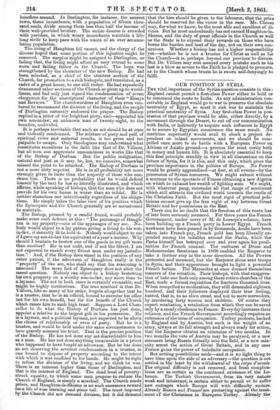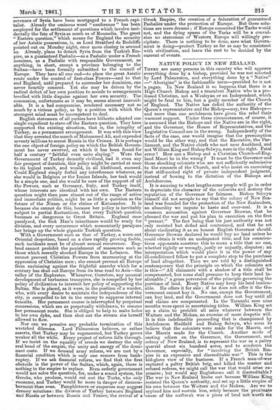OUR POSITION IN SYRIA.
THE vital importance of the Syrian question consists in this : 'England cannot permit a first-class Power either to hold or to command the route to India. As any administration con- ceivable in England would go to war to preserve the absolute neutrality of Egypt, so must it risk war to maintain the practical neutrality of Syria. Any first-class Power in pos- session of that province would be able, either directly, by a movement through the Desert, to cut off our communication with India, or indirectly to acquire such influence in Egypt as to secure by Egyptian connivance the same result. No maritime superiority would avail to check a project de- pendent on inland movements, and we should be com- pelled once more to do battle with a European Power on African or Asiatic ground—a process the most costly both in money and human life. It is absolutely essential to keep this first principle steadily in view in all discussions on the future of Syria, for it is this, and this only, which gives the province importance in the politics of Europe. No Power would be greatly aggrandized—at first, at all events—by the possession of Syrian resources. We might submit without a murmur to the spectacle of France obtaining a new Algeria on which to exhaust her wealth of fighting men. We might, with whatever pang, surrender all that range of sentiment which still attracts the civilized world towards the cradle of the Christian Faith. But the most rigid of practical poli- ticians cannot give up the free right of way between Great Britain and her possessions in the East. There can be no doubt that the freedom of this route has of late been seriously menaced. For three years the French Government, under cover of M. de Lesseps's scheme, have been building up a French party in Lower Egypt. French workmen have been poured in by thousands, Arabs have been taken into French pay, French gold has been liberally ex- pended among the notables around the Pasha, while the Pasha himself has betrayed over and over again his predi- lection for French counsel. The outburst of Druse and Mahommedan fanaticism in 1860 enabled the Emperor to take a further step in the same direction. All the Powers protested and menaced, but the Emperor alone sent troops to Syria, and their appearance brought to light a powerful French faction. The Maronites at once deemed themselves masters of the situation. Their bishops, with that exaggera- tion of hate one finds only among these rotten churches of the East, made a formal requisition for fourteen thousand lives. When compelled to moderation, they still demanded eighteen hundred, and their followers displayed their true feeling, hatred, that is, to an alien creed, and not to mere marauders, by murdering forty women and children. Of course they expect retaliation, a retaliation from which they can be saved only by a steady-obedience to France. Every dayincreases their reliance, and the French Government accordingly requires an extension of the term of occupation. Turkey protests, backed by England and by Austria, but such is the weight of an army, always at its full strength and always ready tor action, that the Emperor obtains an extension of two months. In two months the vote of Austria may be paralyzed, or a new massacre bring Russia formally into the field, or a new cala- mity arrest the action of Great Britain, and in any case France gains the power of indefinite occupation. But setting possibilities aside—and it is no light thing to have time upon the side of an adversary—the question is not settled in the least by the withdrawal of the corps d'armee. The original difficulty is not removed, and fresh complica- tions are as certain as the continued existence of the Le- banon. The Turkish Government, from its very nature weak and intolerant, is certain either to permit or to suffer new outrages which Europe will with difficulty endure. Already Russia and Franceare protesting against the treat- ment of the Christians in European Turkey. Already the revenues of Syria have been mortgaged to a French capi- talist. Already the ominous word " conference " has been employed for the settlement of questions which involve inci- dentally the fate of Syria as much as of Roumelia,. The great -" Eastern question," which means for England the security of her Asiatic possessions, is, as Lord Stratford de Redcliffe pointed out on Monday night, once more closing in around us. Already, plans to detach Syria from the Turkish Em- pire, as a guaranteed Pashalic—as a Pashalic under a French nominee, as a Paahalic with responsible Government, as anything, in short, except a province belonging to the Sultan—have been formally submitted to the council of Europe. They have all one end—to place the great Asiatic route under the control of first-class Powers—and to that end England, until prepared to surrender her dominion, can never heartily consent. Yet she may be driven by the radical defect of her own position to accede to arrangements levelled with little disguise against her own security. The concession, unfortunate as it may be, seems almost unavoid- able. It is a bad compromise, rendered necessary not so much by a vicious policy, as by a position with which the strongest mind must be incompetent to deal. English statesmen of all parties have hitherto adopted one single expedient to stave off the Eastern question. They have supported the existing situation, that is, the integrity of Turkey, as a permanent arrangement. It was with this view -that they arrested the march of Mohammed Ali, and expended seventy millions to arrest Russia in the Crimea. It is perhaps the one object of foreign policy on which the British Govern- -ment has never swerved, on which it has been found for half a century "faithful even unto slaying." Were the Government of Turkey decently civilized, had it even any fair prospect of duration, this policy might be carried at once to its logical result, and would, in all likelihood, succeed. Could England simply forbid any interference whatever, as she would in Belgium or the Ionian Islands, her task would be a simple one, and she would be sure of the support of all the Powers, such as Germany, Italy, and Turkey itself, whose interests are identical with her own. The Eastern question might then pass almost out of the range of active and immediate politics, might be as little a question as the future of the Nizam or the claims of Katinandoo. It is because she cannot do this, because her policy is inevitably subject to partial fluctuations, that every Turkish question becomes so dangerous to Great Britain. England once paralyzed, the Sick Man's inheritance would be ready for division, and every occurrence which momentarily paralyzes her brings up the whole gigantic Turkish question. With a Government such as that of Turkey, a worn-out Oriental despotism, based on a class rapidly growing feeble, such incidents must be of almost annual recurrence. Eng- land cannot prohibit the punishment of massacres such as those which recently shocked Europe in the Lebanon. She cannot prevent Christian Powers from murmuring at the oppression of Christian men ; she cannot prevent all Europe from exclaiming against the frightful anarchy which for a century has shut out Europe from its true road to Asia—the valley of the Euphrates. Whenever, therefore, any unusual development of barbarism transpires, she is compelled by her policy of Civilization to intermit her policy of supporting the Sultan. She is placed, as it were, in the position of a warder, who, with every desire to maintain the independence of the city, is compelled to let in the enemy to suppress internal tumults. Her permanent course is interrupted by perpetual concessions, which are as perpetually withdrawn, to resume her permanent route. She is obliged to help to make holes in her own dyke, and then shut out the stream she herself allowed to flow.
Nor can we perceive any probable termination of this wretched dilemma. Lord Palmerston believes, or rather asserts, that 'Turkey may be regenerated, but Turkey grows weaker all the while. Every project of reform falls through. If we insist on the equality of creeds we destroy the only real bond of the empire, the unity and energy of the domi- nant caste. If we demand army reform, we are met by a -financial condition which is only one remove from bank- ruptcy. If we ask financial reform, we find thit the first obstacle is the power of the Sultan, which, again, there is nothing in the empire to replace. Even orderly government • would not solve the question, for, under a sound system, the Greeks, who produce, would eat out the Turks, who only ' consume, and Turkey would be more in danger of dismem- berment than ever. Pamphleteers or emperors may suggest dreamy solutions : the division of Turkey between England and Russia or between Russia and France, the revival of a Greek Empire, the creation of a federation of guaranteed Pashalics under the protection of Europe. But these solu- tions are mere dreams ; if Europe consented the Turks would not, and the dying spasm of the Turks will be a convul- sion no statesman of Western Europe will willingly pre- cipitate. There is nothing to be done, save what Govern- ment is doing—protect Turkey as far as may be consistent with civilization, and leave the rest to be decided by the current of events.































 Previous page
Previous page